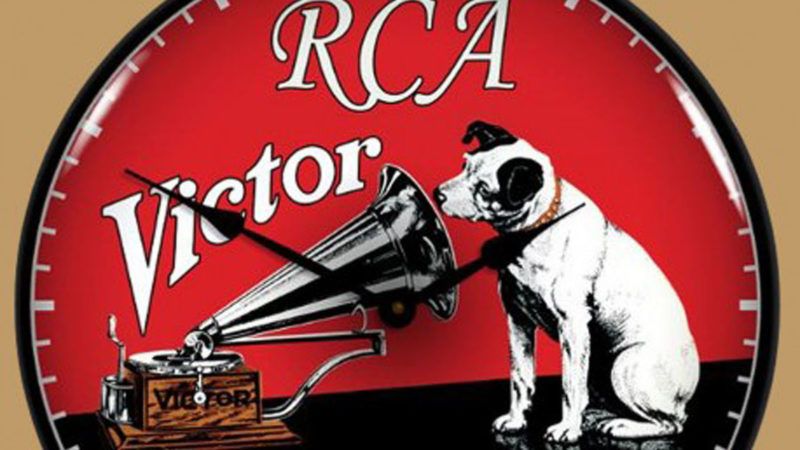How the Government Created RCA
A century before its threats against TikTok, Washington pried a different media company out of foreign hands.

There is a precedent for the White House's moves against TikTok, the Chinese-owned video app that President Donald Trump first threatened to ban and now wants to push into the arms of an American buyer. A century ago, worried about the power another foreign-owned company might wield over a different communications medium, the U.S. government found a way to shift that power into American businessmen's hands.
The story wasn't completely analogous to the current saga. Unlike the present occupant of the Oval Office, Woodrow Wilson didn't declare that he had the unilateral presidential authority to prohibit a platform for people's speech. Nor did he suggest that the U.S. Treasury should grab a "very substantial portion" of the sale price. And it remains to be seen whether Trump's efforts will have as long-lasting an effect as the Wilson administration's scheme, whose impact reverberated for decades.
But there certainly are some similarities between the situations.
The tale begins in the aftermath of World War I. During the fighting, the U.S. Navy had nationalized the American airwaves: It took control of 53 point-to-point wireless stations and shut down virtually all the others. After the armistice, Congress considered a proposal to make this system permanent. Both President Wilson and Navy Secretary Josephus Daniels backed the bill, but it soon became clear that the legislature wasn't going to pass it.
Yet Washington still wanted to ensure that foreigners would not control America's long-distance wireless stations or the technologies those stations used. In particular, they wanted to do something about the American branch of the U.K.-based Marconi Company, which was ready to retake its old stations from before the war. "Fears of Marconi monopoly and fears of British imperialism fed on each other," Hugh Aitken recounts in The Continuous Wave: Technology and American Radio, 1900–1932. Both fears, he added, "were, if not baseless, at least exaggerated": Britain's economy was in bad shape, the Marconi network no longer held a formidable technological lead, and the British government's relationship with Marconi was not "as harmonious as outsiders, particularly Americans, assumed." Still, U.S. officials felt they'd be safer with the company in American hands—and those American hands were happy to receive the goods.

And so, as Susan Douglas put it in Inventing American Broadcasting, 1899–1922, Naval officers "began orchestrating the formation of an all-American company that would buy out American Marconi and remove, once and for all, foreign interests from America's wireless communications networks." Those efforts bore fruit in October 1919, when a new company owned by General Electric took over Marconi's American stations and patents. The newborn operation was called the Radio Corporation of America—better known by its initials, RCA.
Meanwhile, an overlapping process was underway. During the Progressive Era, several American tech companies had developed a strategy of deliberately acquiring patents to block competition. Washington imposed a moratorium on radio patents after America entered the European conflict; in the wake of the war, the government encouraged the corporations that controlled key radio technologies to cross-license their patents. General Electric, Westinghouse, AT&T, and United Fruit ended up forming a patent pool, the members of which all held stock in RCA. This allowed innovation to proceed with less hindrance within those businesses, but with more hindrance outside them; the companies had basically used the government's intellectual-property regulations to create a cartel.
With time, RCA would enjoy a privileged position not just in radio manufacturing but in radio broadcasting. The Radio Act of 1927 allowed regulators to impose much tighter restrictions on who could use the spectrum, and the ensuing years saw many small operations driven off the air. RCA was among the companies that came out ahead. Four radio networks dominated broadcasting in the 1930s: CBS, Mutual, the NBC Red Network, and the NBC Blue Network. The latter two were both owned by RCA.
The same government that issued those patents and broadcast licenses sometimes intervened to limit the power of the beast it had built. An antitrust suit in 1932 forced GE and Westinghouse to divest themselves of their RCA stock, breaking up what The New York Times called "the great radio patent combine." (The divorce from GE was not permanent: In 1986, General Electric purchased RCA.) In the 1940s, following further antitrust activity, the NBC Blue Network was spun off as ABC—a new, non-RCA broadcaster.
But the feds didn't stop helping their war baby. In 1945, as FM radio was just starting to emerge, the Federal Communications Commission abruptly reassigned FM's section of the spectrum to another fledgling technology, television—a move that instantly rendered every FM receiver obsolete. The beneficiaries included RCA, which didn't control the FM patent but had been investing heavily in TV.
It was an egregious gift to the industry incumbents. But Washington's most egregious gift to RCA will always be the time it created the company in the first place. Whatever winds up happening with TikTok, let's hope that's one chapter of history that doesn't repeat itself.
__________
CORRECTION: This article originally described RCA as the "chief force" pushing for the reassignment of the FM band. The corporate lobbying was led by CBS, DuMont, Motorola, and several other companies heavily invested in AM radio broadcasting or manufacturing.
Editor's Note: As of February 29, 2024, commenting privileges on reason.com posts are limited to Reason Plus subscribers. Past commenters are grandfathered in for a temporary period. Subscribe here to preserve your ability to comment. Your Reason Plus subscription also gives you an ad-free version of reason.com, along with full access to the digital edition and archives of Reason magazine. We request that comments be civil and on-topic. We do not moderate or assume any responsibility for comments, which are owned by the readers who post them. Comments do not represent the views of reason.com or Reason Foundation. We reserve the right to delete any comment and ban commenters for any reason at any time. Comments may only be edited within 5 minutes of posting. Report abuses.
Please to post comments


Jesse isn't tooting his own horn, but if you appreciate history like this, I recommend his book, Rebels on the Air. Lots of fascinating stories from the early radio days up to recent times. It is especially amazing how often government meddled, usually not very competently, but always with some result, planned or not.
"Everything government touches turns to shit." -Ringo Starr
What about what Trump touches?
Can’t wait to see what happens when we discover alien life.
The same thing that happened to the natives when Europe discovered the Americas, except this time we'll be the natives.
Iain Banks described it pretty well---and his was the optimistic case---with his "Outside Context Problem," from Excession:
"...most civilizations would encounter [an OCP] just once, and which they tended to encounter rather in the same way a sentence encountered a full stop."
Damn, I miss the guy.
The reason why The U.S Government wants to ban TicTok is
One China law demands absolute cooperation with China military and intelligence agency.
Two TicTok is partially owned by C.P.P and it's military from what I remember ( Just go check out ntd news )
Three The C.C.P passed a law saying they have the right to jail people for life for criticizing the C.C.P even people who are not citizens of China. Such as us Americans, which most likely many of Reason Magazine have violated China new law.
Four All China's companies are partly or fully owned by the Chines government. These are not privately owned companies.
The issue with TikTok is about espionage not free market or free speech. So please stop defending TikTok.
Comparing internet apps to radio is apt. Full of amateur people broadcasting nonsense and boring music.
Also it should inform you of where these internet garbage companies will be in a century. Get your money while you can and get out.
Marconi played the Mamba. Listen to the radio.
If Marconi actually played the mamba, he would have come to a very quick end.
Marconi played the Mamba. Listen to the radio.
I realize that things can get pretty rough down in these comment threads, but there's no call for inflicting that song on people. Some stuff is just beyond the pale.
Calling "We Built This City" a song is offensive and triggering.
Jeebus you're citing Woodrow Wilson for presidential restraint?
Sure, he tortured suffragettes, segregated the federal workforce, watched Birth of a Nation in the White House, but at least he wasn't orange!
lol I forgot about the chicks I was talking about the taxes (16) and senators (17)
Good ole' General Sarnoff (RCA), he purchased congressmen so we could get the inferior 525 line tv standard instead of the superior Dumont system. And when videodiscs came into play he went down with the ship defending tried and true needle technology against those newfangled lasers thingies Philips was pushing.
I like how the article completely ignores the reason for this, that it's essentially Chinese government spyware
I think the amount of outrage issued by the Chinese government is a pretty clear indicator of how "strategic" a thing is. They've been a bit grumpy about the Tik-Tok thing.
But it's nothing compared to the high pitched shrieking about Huawei. In banning Huawei you might as well have been taking a large dump on a Chinese flag, then smearing it all over a picture of Chairman Xi and then singing about how the communists spent WW2 selling opium to the Japanese in exchange for being left alone. Which suggests that the Huawei = CCP spyware is probably true. Tik-Tok by comparison, less so.
As a counterpoint just how much outrage did the US Govt raise after various nations banned Cisco kit from their infrastructure after the Snowden revelations (hint - not much).
The story about FM involves RCA's AM radio market as well. David Sarnoff, who headed up RCA in those days did many things to cripple FM technology and retain RCA's AM radio network and its manufacturing of AM radio equipment. There was an FM radio station setup in New Jersey in the 30's to broadcast in the New York City metro area. RCA played a lot of dirty trick and pulled government strings to hobble FM long before TV was a thing. It was the 70's before FM radio really took off due to its superior sound quality. A similar thing happened to cable TV, introduced in the 60's. The TV broadcast industry fought hard to keep it on the sidelines and it worked for 20 or so years.
The US (government) will accelerate the descent of American technology into a cesspit far, far beneath the bottom of China's.
It's what governments do. Even China's, thank God.